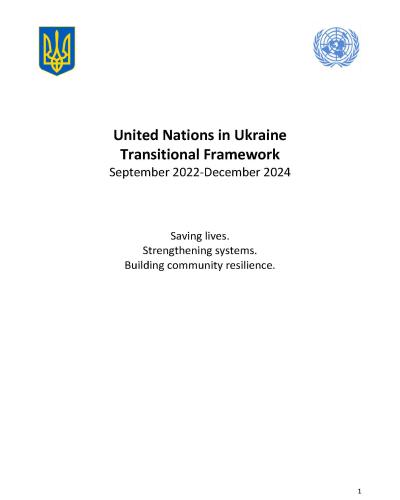United Nations in Ukraine Transitional Framework

This Transitional Framework (TF) 2022-2024 is the strategic document of the United Nations in Ukraine in support of the Government of Ukraine’s response to the economic and social impact of Russia’s invasion and war against Ukraine. The Transitional Framework was first developed for the period 2022-2023 and then reviewed and extended until the end of 2024.
The TF remains guided by the objectives of Agenda 2030, and in the absence of a National Recovery Plan, it is aligned with the Government of Ukraine’s emergency early recovery priorities, national policy reform priorities, upcoming State Strategy for Regional Development and national sectoral strategies. The interventions in the Transitional Framework reflect the strong sectoral cooperation and partnership between the United Nations and government ministries and bodies. The TF was developed by the United Nations in Ukraine in close consultation with Government counterparts, key international development partners, national civil society and international NGOs.
The TF is fully aligned with the Humanitarian Programme Cycle (reflected as Strategic Priority 1). It also addresses early recovery needs through a nexus approach (Strategic Priority 2), as well as the longer-term policy reform priorities of the Government. The revision and extension of the TF draws on the joint analysis of the Common Country Analysis 2023 and good practice and lessons learned from the past months of the response to the impact of the war.
The transitional framework serves as a bridging document between the previous UN-Ukraine Partnership Framework (2018-2022) and the new UN Sustainable Development Cooperation Framework (2025-2029).
For 2024, the framework, developed jointly by the UN entities under the leadership of the Resident Coordinator, has identified short-term urgent recovery needs of almost 10 million individuals that the UN will reach, as well as supporting state systems and institutions to amend and adopt more than 38 policies, regulations and laws, clear more than 6.8 million square meters of land from debris and unexploded ordinance, and restore social and critical community infrastructure that will benefit 5.7 million individuals. The TF has a funding requirement in 2024 of US$1.9 billion.
The updated transitional framework is underpinned by the sector assessments conducted by the UN entities since March 2022, the second Rapid Damage and Needs Assessment (RDNA), the PDNA Kakhovka dam destruction appraisal, the Common Country Analysis 2023, the Multi-Sectoral Needs Assessment 2023 and the many other monitoring reports and evidence available. As the context remains fluid and dynamic, the UN’s programme management team will continue to conduct a joint analysis of the situation to ensure that the priorities of this framework remain robust and relevant.
The medium and long-term response to the impacts of this war and the resulting sustainable development challenges will be reflected in the Cooperation Framework to be developed during 2024 and launched in January 2025.

















